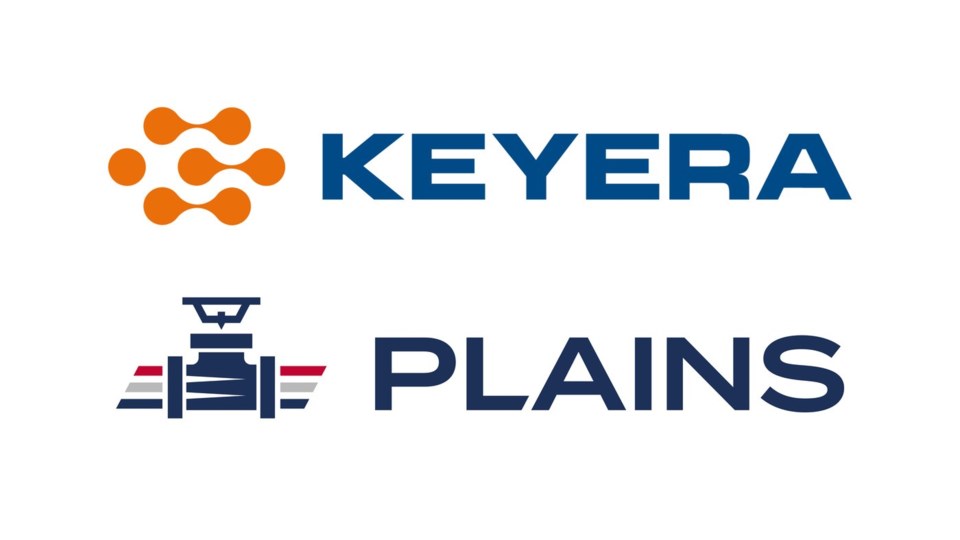CALGARY — Keyera Corp.'s deal to buy the Canadian natural gas liquids business of U.S. firm Plains for $5.15 billion will help boost this country's energy security and economic resilience, its chief executive says.
"This is by far the largest acquisition that we've ever undertaken. We don't take it lightly," CEO Dean Setoguchi said in an interview Wednesday.
The assets under the deal include 193,000 barrels per day of "fractionation capacity," where gas and liquids are separated, as well as 23 million barrels of storage capacity and more than 2,400 kilometres of pipeline infrastructure.
The deal also covers gas processing operations and loading and logistics infrastructure, including Canadian and U.S. truck and rail terminals.
Keyera said the transaction will not only benefit its customers and shareholders, but also help reinforce Canada's role as a global energy leader.
"It's a great Canadian story," said Setoguchi, adding that much of the cash Plains had generated from its operations in Canada flowed to the U.S.
"With this acquisition, it will be in the hands of a Canadian company and their Canadian management and board," said Setoguchi.
The deal is expected to close in the first quarter of 2026, subject to customary closing conditions.
A lawyer who worked on the deal said while the Plains assets had long been on Keyera's radar, negotiations got into high gear over the past week or so.
"It was very intense, with many, many long nights along the last number of days," said Kirk Litvenenko, senior partner and Canadian national chair of business law at Norton Rose Fulbright.
The deal came together against the backdrop of global turmoil that has rattled energy markets. Just as the team was putting the final touches on the transaction, Israel began its military assault on Iran, causing crude oil prices to spike.
"Uncertainty is a difficult thing at times to work your way through because you can't plan, but things worked out very well," Litvenenko said.
Keyera shares soared almost six per cent on Wednesday to close at $44.47.
Keyera is focused on gathering, processing, transporting and marketing natural gas and natural gas liquids, like propane and butane. Natural gas liquids, also known as condensate, can also be used to dilute oilsands bitumen so it can be transported via pipeline.
The Plains deal, which includes infrastructure in Alberta, Saskatchewan, Manitoba and Ontario, will help Keyera create a fully connected corridor for natural gas liquids stretching from west to east.
The federal Liberal government has introduced legislation that would speed along the regulatory process for infrastructure projects deemed in the national interest, as U.S. President Donald Trump upends a once reliable cross-border trading relationship with on-again, off-again tariffs.
Canadian energy industry leaders have said the U.S. will always be a key customer for their oil and gas, but it's important to diversify to other markets and build the transportation infrastructure needed to make that happen.
Alberta Premier Danielle Smith has been trying to entice a pipeline company or consortium to propose building a bitumen conduit to Prince Rupert, B.C., that she hopes Ottawa would expedite as a "nation building" project.
An oilsands pipeline wouldn't be a fit for Keyera's business, but Setoguchi said he likes the general idea of designating a corridor where there could be streamlined permitting for key infrastructure projects.
"Directly, we wouldn't be involved likely in any sort of pipeline built to the West coast," he said.
But Keyera would have opportunities to build infrastructure serving companies whose production growth would fill any potential new pipelines, he said.
Last week, Keyera announced an agreement to double the volume of petroleum liquids it plans to export through a West Coast export facility being built by AltaGas Ltd.
AltaGas said in February that Keyera had contracted 12,500 barrels per day of capacity to ship the gas to Asia via the Ridley Island Energy Export Facility near Prince Rupert, B.C.
That is to rise to 25,000 barrels per day under 15-year tolling agreements.
The facility is to be used to export propane and butane in its first phase, with the possibility of expanding into ethane and other valuable liquids in the future.
While low carbon fuels have taken a back seat in recent years, Setoguchi said eventually Keyera could look at ways to export biofuels and other greener products via the B.C. coast.
"I believe with some of the infrastructure, we could repurpose it or expand it to handle those types of products as well to export off the west coast to Asian countries."
This report by The Canadian Press was first published June 18, 2025.
Companies in this story: (TSX: KEY)
Lauren Krugel, The Canadian Press



